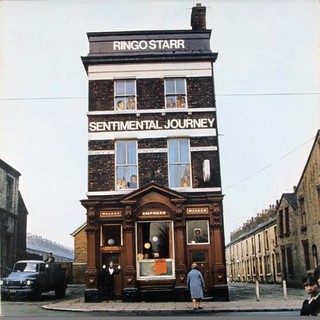It’s high time we address a major conundrum of such a chronicle as this: How does one explore the solo careers of the Beatles while excluding Ringo? Easy, says Everybody’s Dummy. Impossible, says everyone else who’s undertaken such an assignment. But let’s be reasonable here; very little Ringo did after 1969 stands up with the efforts of the three songwriting Beatles, and the little that did usually had the help of one of those Beatles, and probably George. So to be fair, here’s a look at Ringo’s Apple output. There’s little need to go further.
But because we like to educate, illuminate, and encompass as well as entertain, the self-styled luckiest man in showbiz is getting more complete treatment, starting here. His post-Beatles career may not be as stellar as the others’, but he still put in his time, and he deserves better than a single post. (Besides, we’ve typed more words on lesser figures, and way worse albums.)As the future of the band was in doubt come late 1969, Ringo was justifiably concerned as to how he’d spend his time henceforth. Acting was a possibility but not a given, and unlike the other three he didn’t do much songwriting, and didn’t have a backlog of tunes waiting to be heard. So he turned to a pet project he’d considered from time to time.
Sentimental Journey was a collection of old standards, the type of songs his mother and stepfather used to enjoy singing at gatherings and at the pub depicted on the cover. Each track was arranged big band-style by a different musician, from buddies like Klaus Voormann and Maurice Gibb to more known entities as George Martin and Quincy Jones. Some are straightforward, some are horribly dated, and most sound like the fare one would hear on any TV variety show of the time. And each one was sung by Ringo, as only he could. He didn’t even have to play the drums.
The title track is fairly indicative of the album as a whole, and re-establishes his “aw, shucks” brand. (The arranger was Richard Perry, who will loom large in the near future.) It’s also the highlight of both sides, as the schtick wears thin. His first pitch limitations are all over “Night And Day”, double-tracked on “Blue, Turning Grey Over You” and the banjo-laden “Bye Bye Blackbird”. McCartney is listed as the arranger for “Stardust”, but it’s more likely George Martin, who also did “Dream”. “Whispering Grass” is mostly harmless, but “Have I Told You Lately That I Love You” is the absolute pits. The rest of the tracks aren’t really worth discussing, except that they’re not quite as bad as that.
Without realizing it, Sentimental Journey proved Ringo was a trendsetter, being the first rock star to go the standards route one day trod by Linda Ronstadt, Rod Stewart, and Bob Dylan; even Paul McCartney wouldn’t do his own take for forty years. But at the very least, it’s a vanity album, something he could have given his mother for her birthday rather than foist on the public during a busy Beatle release schedule. The question remains: how often did she listen to it, assuming she did?
Ringo Starr Sentimental Journey (1970)—1½

When I think of solo Ringo, this is always the first thing that comes to mind:
ReplyDeletehttp://www.youtube.com/watch?v=oGLL-TMNMTU
I'm a little disappointed that you didn't mention it, if only to make fun of the goofy police uniform.
-Vance
I'll go as far as saying "Photograph" is the best post-Beatles track by any former Beatle or combination thereof.
ReplyDeleteI'll also argue that Ringo is one of the most important drummers in the history of rock/pop music.
Note to Paul suckups: Please don't retell the "Dear Prudence" story for the 353nd time!
Ringo = the Dummy of the group
ReplyDeletePerhaps, Anonymous. But even every medical school graduates a doctor at the bottom of the class. They wouldn't have been the same without him.
ReplyDeleteDon't forget that he had more hits than the other 3 for a short while..
ReplyDeleteI shan't! All will be revealed!
DeleteA couple of Ringo's hits were written by former Beatles.
ReplyDeleteIndeed. We shall cover those in due time.
Deletei don't think he is that bad, yeah he can be cartoonish but he has a regular charm in his voice and in this collection of standards, other people got involved from art garfunkel to rod stewart and even lady gaga doing duets with the late tony bennett. ringo is more a singer making a variety show but i might give this a 3, i know he didn't write anything and i might do solo roger daltrey, even mister scream, did not write anything. this album is made for ringo fans or completists.
ReplyDelete